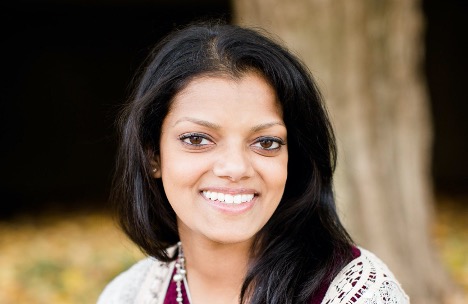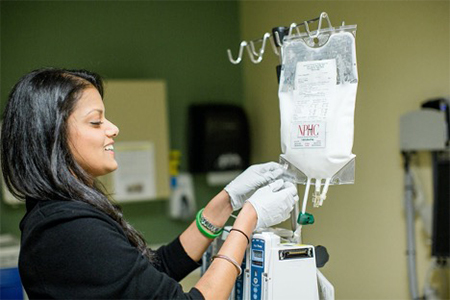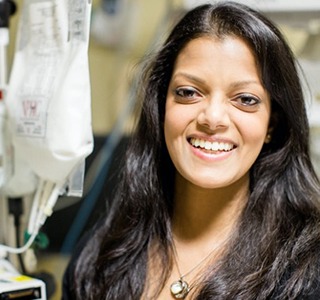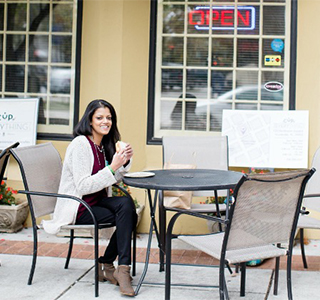PTLD Stories of Strength
View More Stories
Swapna, PTLD Advocate
Huntsville, AL
Living with short bowel syndrome
Small intestine transplant recipient
I have found my passion in speaking and creating a larger platform—to use the experiences I have gone through to improve healthcare for all stakeholders.
Swapna carries her laptop as she walks around the house, trying to find the best internet connection for a video call. It is an activity that is all too familiar during the COVID-19 pandemic. The modem and router are in her mother’s study, which she must fastidiously avoid. Krishna, an OB-GYN, is still seeing patients and delivering babies through the outbreak, so she and Swapna are keeping distance in the home they share. Contracting SARS-CoV-2 would put Swapna’s life in serious danger.
 Despite the stay-at-home order, the pandemic has been an increasingly busy time for Swapna. She is on the verge of completing her Masters in Public Health from the University of Alabama while simultaneously running Alabama Rare, a grassroots organization that seeks to unify and uplift people living with rare diseases in her home state. From her parents’ house, Swapna is busy networking and gathering information from rare disease families, trying to assess the impact of COVID-19 on their lives. “This is uncharted territory. There are no rules for what is going on right now, and things are changing by the day,” she relates. “Some families have lost their jobs or they’ve been furloughed and so that’s what we want to quantify.” She is gathering information by sending a burden survey while sharing accurate and trustworthy resources on a variety of subjects, including updates to FDA protocols, clinical trials, and the stimulus bill—all in an attempt to help others living with rare diseases during these uncertain times.
Despite the stay-at-home order, the pandemic has been an increasingly busy time for Swapna. She is on the verge of completing her Masters in Public Health from the University of Alabama while simultaneously running Alabama Rare, a grassroots organization that seeks to unify and uplift people living with rare diseases in her home state. From her parents’ house, Swapna is busy networking and gathering information from rare disease families, trying to assess the impact of COVID-19 on their lives. “This is uncharted territory. There are no rules for what is going on right now, and things are changing by the day,” she relates. “Some families have lost their jobs or they’ve been furloughed and so that’s what we want to quantify.” She is gathering information by sending a burden survey while sharing accurate and trustworthy resources on a variety of subjects, including updates to FDA protocols, clinical trials, and the stimulus bill—all in an attempt to help others living with rare diseases during these uncertain times.
As an influential advocate and professional public speaker, Swapna has taken her inspiring message—based on her own story of living with short bowel syndrome (SBS), surviving over 60 surgeries, a small intestine transplant, and a form of post-transplant lymphoproliferative disease (PTLD)—to audiences locally and nationally. She has spoken in front of Congress, worked at a national non-profit, and told her story at healthcare conferences, on syndicated radio programs, and popular online platforms. Swapna was born with ileal atresia, a congenital defect in her ileum, which led to SBS, a rare disorder in which the small intestine cannot adequately absorb nutrients from food. Her journey comes filled with lessons on managing chronic conditions, improving patient-doctor relations, and mustering the inner resilience to get through frightening medical difficulties. “I have found my passion in speaking and creating a larger platform,” she says. “To use the experiences I have gone through to improve healthcare for all stakeholders.”
I have found my passion in speaking and creating a larger platform—to use the experiences I have gone through to improve healthcare for all stakeholders.
A Challenging Start
Swapna has not always been so forthright and outspoken. “When I was a kid, I didn’t tell my friends or extended family what I was going through,” she admits. “It’s funny how much I share now.” She was born and raised in Huntsville, Alabama, where her parents had immigrated from their native country of India. From an early age, living with SBS was extremely challenging. “I was not fed by mouth for my first year of life,” says Swapna. “I needed to be fed through an IV line throughout my childhood.” Day and night, nourishment came via IV lines, gastrostomy tubes, and specialized formulas. Each day, Swapna had to lug two backpacks to school: one for her books and one for her feeding tubes and formula. “I never got bullied because of my extra backpack.” The accepting community around her helped Swapna adjust to her situation, but she did not feel comfortable sharing the difficulties she faced openly. “I hoped and prayed that I would be just like my peers, with no IVs and tubes.”
However, as Swapna transitioned into adulthood, her issues with SBS got worse. She experienced frequent IV line infections, which along with difficulty absorbing solid food, led to experimental abdominal surgeries, and unfortunately, severe complications.
During her sophomore year of college, Swapna began suffering from fistulas: abnormal connections between bodily cavities that formed in the spaces between her skin and organs. “I was in the ICU for seven weeks and had five abdominal surgeries in that time,” she says. Her doctors fought to save her failing intestines. She was told to avoid all solid foods, which she did diligently for the next three years. An intestinal transplant started to seem like the only option. Feeling unsure about the future, Swapna began reaching out to more friends. She started a blog in an effort to close the gap between what her friends knew and the stark reality that was her life. “That distance was starting to get less and less,” she recalls.
 After a lengthy bout in the ICU, Swapna returned to her studies, and new opportunities presented themselves. She was invited to be a keynote speaker at a gala for a local non-profit, an event coincidentally held at the same auditorium where she had graduated high school. It was a groundbreaking moment. “That was the first time I had shared my story publicly with my hometown,” she says. “I put all my heart into it and, after I spoke my last word, I looked up and saw 300 people giving me a standing ovation. ” After the speech, audience members approached Swapna saying how her words had moved them. Becoming fully seen and heard for who she was proved life-changing for Swapna, and opened the door for her career as a professional speaker.
After a lengthy bout in the ICU, Swapna returned to her studies, and new opportunities presented themselves. She was invited to be a keynote speaker at a gala for a local non-profit, an event coincidentally held at the same auditorium where she had graduated high school. It was a groundbreaking moment. “That was the first time I had shared my story publicly with my hometown,” she says. “I put all my heart into it and, after I spoke my last word, I looked up and saw 300 people giving me a standing ovation. ” After the speech, audience members approached Swapna saying how her words had moved them. Becoming fully seen and heard for who she was proved life-changing for Swapna, and opened the door for her career as a professional speaker.
A Match is Made
 Six months after Swapna completed her bachelor’s at the University of Alabama in Birmingham, her doctors made the call: It was time to try and get her a new small intestine. Miraculously, not long after getting on the transplant list, Swapna was informed that they had a match. Swapna and Babu, her father, moved to Cleveland, believing the Cleveland Clinic would be able to provide her the best care for her transplant and recovery. “We rented a house for a year,” she says. “They prepared us for that. We just hoped it would not have to take that long.” On the evening of June 18, 2014, Swapna went into surgery and, when she awoke, new possibilities started to race through her mind and body. “After the transplant, I was going to have the opportunity for the first time in my life to wean off the IV nutrition,” says Swapna. She had never felt closer to realizing that dream.
Six months after Swapna completed her bachelor’s at the University of Alabama in Birmingham, her doctors made the call: It was time to try and get her a new small intestine. Miraculously, not long after getting on the transplant list, Swapna was informed that they had a match. Swapna and Babu, her father, moved to Cleveland, believing the Cleveland Clinic would be able to provide her the best care for her transplant and recovery. “We rented a house for a year,” she says. “They prepared us for that. We just hoped it would not have to take that long.” On the evening of June 18, 2014, Swapna went into surgery and, when she awoke, new possibilities started to race through her mind and body. “After the transplant, I was going to have the opportunity for the first time in my life to wean off the IV nutrition,” says Swapna. She had never felt closer to realizing that dream.
Post-transplant, Swapna had her IV line and gastrostomy tube removed. A week later, she celebrated her 25th birthday with a lavish meal at Food Network celebrity chef Michael Symon’s Cleveland restaurant. There was much relief, but complications lay on the horizon. A few days later, Swapna noticed a strange change to the stoma that was created during her transplant. “It had opened up in a little semicircle and there was a little yellow in the center.” She visited the clinic to get it checked out but was told it was most likely an “injury to the stoma.” However, due to Swapna’s perseverance and experience with the medical system, she insisted on further investigation. “I had this gut feeling it was more serious.” The doctor looked at the stoma, took a picture, and texted it to the surgeon. The surgeon, who happened to be out of the country, responded promptly and called for immediate action. “He said, ‘Do a biopsy now.’ That’s when I had a bad feeling.”
A day later, Swapna was notified that she had developed PTLD. “My PTLD was diagnosed early, in part because of my advocacy and following my gut instinct,” she says. “That ended up saving my life.” Swapna found herself back in the hospital to undergo treatment. She felt she had taken a huge step back from her goals. “Two weeks after getting my central line out for the first time in my life, I had to get another one placed in the same location.”
Swapna received infusions for a total of five weeks, traveling back to the hospital for each one. “It wasn’t physically painful,” she reflects. “But it was exhausting. I wouldn’t want to get out of bed until 3 p.m. some days. I became depressed.” However, she feels that PTLD, while serious, has not been the worst complication that she’s experienced since her small intestine transplant. “I’m fortunate to have done well. I had B-cell PTLD, got on a treatment, and recovered. Then, I got aspergillosis of the lung, and after that I needed a bilateral hip replacement.” Swapna continues to struggle with complications from her transplant including debilitating pain in her shoulders, which she expects will eventually have to be surgically corrected.
 While she still gets some IV-based nutrition, Swapna is now able to eat regular meals for one of the first times in her life. “I cook simple food, things that are good for my gut,” she explains, “but I’m finishing more plates than ever, and I’m increasing my calories every day by mouth, versus other ways.” Scheduling meals is still difficult, as Swapna was accustomed to skipping them, but slowly, she is figuring out her routine and, as a result, is living a healthier life. “There’s a lot of things I’m able to do much better five years post-transplant, but I think there are some things that I will have to deal with for a long time.”
While she still gets some IV-based nutrition, Swapna is now able to eat regular meals for one of the first times in her life. “I cook simple food, things that are good for my gut,” she explains, “but I’m finishing more plates than ever, and I’m increasing my calories every day by mouth, versus other ways.” Scheduling meals is still difficult, as Swapna was accustomed to skipping them, but slowly, she is figuring out her routine and, as a result, is living a healthier life. “There’s a lot of things I’m able to do much better five years post-transplant, but I think there are some things that I will have to deal with for a long time.”
It was so important for me to meet others with my condition.
Pursuing Her Passion
With renewed energy post-transplant and post-PTLD, Swapna began to find her purpose in the world. She also found a community. “It was so important for me to meet others with my condition,” she says. She started a Facebook group for others who had endured small intestine and multivisceral transplants as well as PTLD, and began networking. And she returned to telling her story professionally. She started speaking at large healthcare conferences and her talks were featured on The Moth radio broadcast as well as TEDx talks. With the popularity of her speeches quickly soaring, larger patient advocacy organizations took notice. She got a job with the National Organization for Rare Disorders (NORD), where she gained real-world experience and valuable perspective on the intricacies and incredible diversity of the rare disease community—people like her who desire better services, treatment, and recognition.
We’re all interconnected. This is such a unique moment in all of our lives. We’re all experiencing it. We have so many similarities and so we should unite and advocate for everyone in the larger community.
In 2017, Swapna returned to Alabama with a mission and founded Alabama Rare. The initiative has helped bring together hundreds of people living with rare diseases to stand united for better healthcare treatments and legislative advocacy. The organization is small (with her and a partner) but continues to grow.
I tell people to be realistic but don’t lose hope.
Amidst the pandemic, her work remains crucial. “I always say advocacy never stops. I truly believe that, especially now during this time.” She sees members of the rare disease community as extremely vulnerable during the coronavirus outbreak, and prime examples of how to manage and overcome medical adversity. “We’re all interconnected,” she muses. “This is such a unique moment in all of our lives. We’re all experiencing it. We have so many similarities and so we should unite and advocate for everyone in the larger community.” The road ahead appears to be long and hard, but Swapna knows that it will take a unified humanity—inclusive of all disorders and abilities—to come out the other side stronger. “I tell people to be realistic,” she concludes, “but don’t lose hope.”